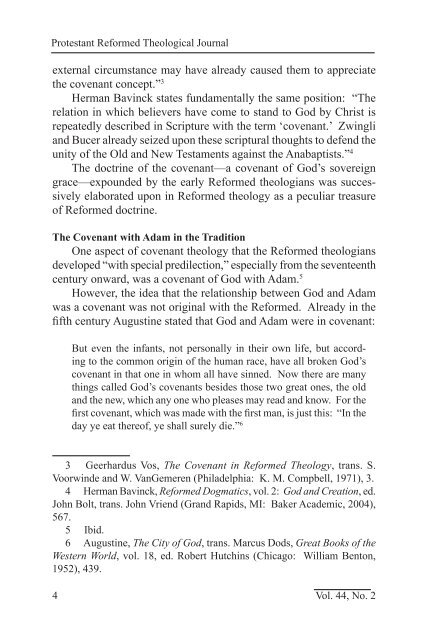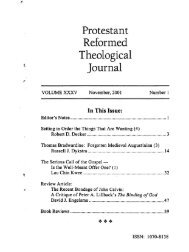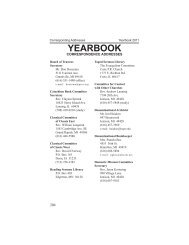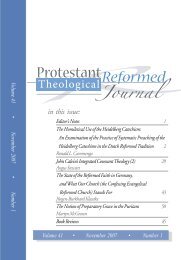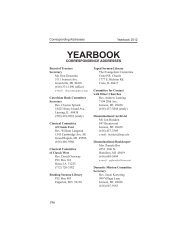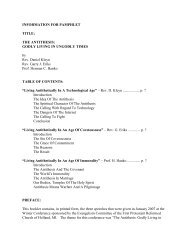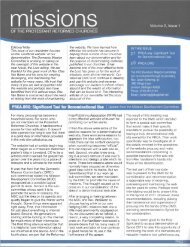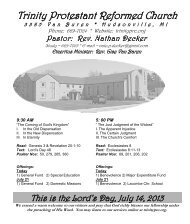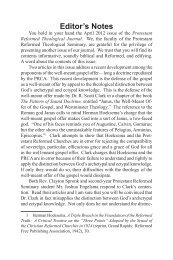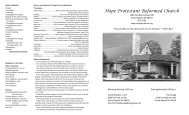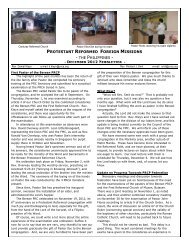A Critique of the Covenant of Works in Contemporary Controversy
A Critique of the Covenant of Works in Contemporary Controversy
A Critique of the Covenant of Works in Contemporary Controversy
Create successful ePaper yourself
Turn your PDF publications into a flip-book with our unique Google optimized e-Paper software.
Protestant Reformed Theological Journal<br />
external circumstance may have already caused <strong>the</strong>m to appreciate<br />
<strong>the</strong> covenant concept.” 3<br />
Herman Bav<strong>in</strong>ck states fundamentally <strong>the</strong> same position: “The<br />
relation <strong>in</strong> which believers have come to stand to God by Christ is<br />
repeatedly described <strong>in</strong> Scripture with <strong>the</strong> term ‘covenant.’ Zw<strong>in</strong>gli<br />
and Bucer already seized upon <strong>the</strong>se scriptural thoughts to defend <strong>the</strong><br />
unity <strong>of</strong> <strong>the</strong> Old and New Testaments aga<strong>in</strong>st <strong>the</strong> Anabaptists.” 4<br />
The doctr<strong>in</strong>e <strong>of</strong> <strong>the</strong> covenant—a covenant <strong>of</strong> God’s sovereign<br />
grace—expounded by <strong>the</strong> early Reformed <strong>the</strong>ologians was successively<br />
elaborated upon <strong>in</strong> Reformed <strong>the</strong>ology as a peculiar treasure<br />
<strong>of</strong> Reformed doctr<strong>in</strong>e.<br />
The <strong>Covenant</strong> with Adam <strong>in</strong> <strong>the</strong> Tradition<br />
One aspect <strong>of</strong> covenant <strong>the</strong>ology that <strong>the</strong> Reformed <strong>the</strong>ologians<br />
developed “with special predilection,” especially from <strong>the</strong> seventeenth<br />
century onward, was a covenant <strong>of</strong> God with Adam. 5<br />
However, <strong>the</strong> idea that <strong>the</strong> relationship between God and Adam<br />
was a covenant was not orig<strong>in</strong>al with <strong>the</strong> Reformed. Already <strong>in</strong> <strong>the</strong><br />
fifth century August<strong>in</strong>e stated that God and Adam were <strong>in</strong> covenant:<br />
But even <strong>the</strong> <strong>in</strong>fants, not personally <strong>in</strong> <strong>the</strong>ir own life, but accord<strong>in</strong>g<br />
to <strong>the</strong> common orig<strong>in</strong> <strong>of</strong> <strong>the</strong> human race, have all broken God’s<br />
covenant <strong>in</strong> that one <strong>in</strong> whom all have s<strong>in</strong>ned. Now <strong>the</strong>re are many<br />
th<strong>in</strong>gs called God’s covenants besides those two great ones, <strong>the</strong> old<br />
and <strong>the</strong> new, which any one who pleases may read and know. For <strong>the</strong><br />
first covenant, which was made with <strong>the</strong> first man, is just this: “In <strong>the</strong><br />
day ye eat <strong>the</strong>re<strong>of</strong>, ye shall surely die.” 6<br />
3 Geerhardus Vos, The <strong>Covenant</strong> <strong>in</strong> Reformed Theology, trans. S.<br />
Voorw<strong>in</strong>de and W. VanGemeren (Philadelphia: K. M. Compbell, 1971), 3.<br />
4 Herman Bav<strong>in</strong>ck, Reformed Dogmatics, vol. 2: God and Creation, ed.<br />
John Bolt, trans. John Vriend (Grand Rapids, MI: Baker Academic, 2004),<br />
567.<br />
5 Ibid.<br />
6 August<strong>in</strong>e, The City <strong>of</strong> God, trans. Marcus Dods, Great Books <strong>of</strong> <strong>the</strong><br />
Western World, vol. 18, ed. Robert Hutch<strong>in</strong>s (Chicago: William Benton,<br />
1952), 439.<br />
4<br />
Vol. 44, No. 2


